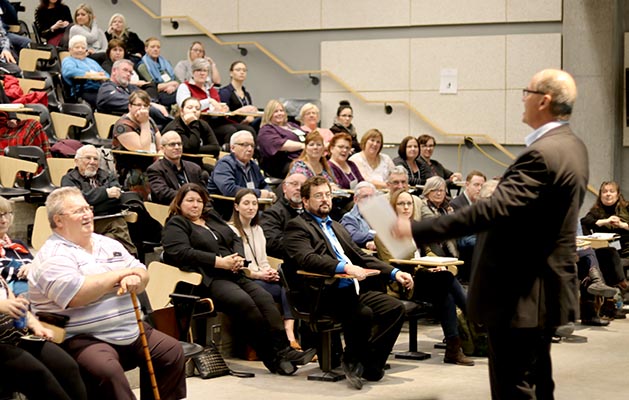Project Overview

While strategies are in place to support aging offenders within Correctional Service Canada (CSC) institutions, relatively little attention has been directed towards understanding their community reintegration. Due to a combination of unique and complex health needs, as well as the stigma of incarceration, aging offenders face a plethora of barriers and challenges when transitioning from a correctional institution to community. In order to help overcome the challenges, solutions are being implemented at various scales to ease the reintegration process; however, there is a need for additional support from both government and community stakeholders alike.
In order to address these gaps, Trent University in Peterborough, Ontario, established the Community Reintegration of Aging Offender (CRAO) collaboration. The CRAO collaboration involves the work and cooperation of Canadian community-based partners from Trent University, Trent Centre for Aging & Society, Dalhousie University, Correctional Service Canada, Peterborough Reintegration Services and Citizens Advisory Committee. The CRAO collaboration projects feature a symposium, a gaps in knowledge report and a pilot project that examine the challenges and barriers associated with the community reintegration of aging offenders.
Funded by Correctional Service Canada, Citizens Advisory Committee and the Canada Research Chairs program (Mark Skinner, Trent University) .
No Place to Call Home Symposium
Trent University, in collaboration with the Trent Centre for Aging & Society (TCAS), CSC, the Citizens Advisory Committee (CAC), and Peterborough Reintegration Services (PRS), held Canada’s first symposium on the community reintegration of aging offenders. No Place to Call Home: The Challenges of Reintegrating Senior Parolees into the Community and Long-term Care was held on February 22, 2018 with more than 160 administrators, staff, officers, volunteers, researchers and students from CSC, CACs, chaplaincies, community reintegration services, community support, long-term care, palliative care, universities and other stakeholders in attendance.
Featuring three keynote speakers from CSC (Director General, Clinical Services and Public Health), Dalhousie University (Health Law Institute) and PRS (Haley House), and a panel of key stakeholder’s perspectives from police, parole, health care and human rights law, the symposium was designed to initiate critical conversation about gaps in knowledge. Additionally, a model for community reintegration, Haley House, was a featured discussion.

Community Reintegration of Aging Offenders: Gaps in Knowledge Report
Published in May 2019, the Community Reintegration of Aging Offenders: Gaps in Knowledge Report features an overview of literature concerning the community reintegration of aging offenders, expert perspectives on the community reintegration process, frontline knowledge regarding the barriers, issues and solutions to community reintegration of aging offenders and provides directions on how to propel this thread in inquiry forward.
The objectives of the Gaps in Knowledge Report are, 1) to provide a background on the community reintegration of aging offender literature, 2) to showcase expert perspectives on community reintegration of aging offenders, and 3) to outline the frontline knowledge of the barriers, issues and solutions to the community reintegration of aging offenders.
CRAO Pilot Project
To further address the gaps in knowledge about the community reintegration of aging offenders, the CRAO collaboration launched the Community Reintegration of Aging Offenders (CRAO) Pilot Project in July 2018. The goal of the one year, now completed, pilot project was to examine the experiences of aging male offenders as they transition from correctional institutions into the community, and to better understand the organizational structure and approach of Haley House. The objectives are 1) to document the issues, challenges and opportunities of community reintegration of aging offenders, and 2) to establish the conceptual and methodological foundations for a multi-jurisdictional CRAO research project across Canada. Findings from the CRAO Pilot Project can be found in an accompanying findings report, published in June 2019.
Publications
Articles
Community reintegration of previously incarcerated older adults: Exploratory insights from a Canadian residential community facility program
Authors: Amber Zapletal, Mark Skinner, Gillian Balfour, David Byrne, Crystal Dieleman (2023)
Journal of Aging & Social Policy, 35(4)
[ Access here ]
Lost in transition? Community residential facility staff and stakeholder perspectives on previously incarcerated older adults transitions in care
Authors: Laura Poulin, Amber Zapletal, Mark Skinner, Gillian Balfour, David Byrne, and Crystal Dieleman (2023)
BMC Geriatrics, 23:180
[ Access here ]
Project Reports
Community reintegration of aging offenders: Gaps in knowledge report
Author: Amber Zapletal (2019)
[ Access here ]
Community reintegration of aging offenders (CRAO): Pilot project report
Author: Amber Zapletal (2019)
[ Access here ]
Presentations
Community reintegration of previously incarcerated older adults: Exploratory insights from a Canadian community residential facility program
Contributors: Amber Zapletal, Trent University; Mark Skinner, Trent University; Gillian Balfour, Thompson Rivers University; David Byrne, Centennial College; Crystal Dieleman, Dalhousie University.
International Federation on Aging 15th Global Conference on Ageing, November 2021
[ Presentation PDF ]
Exploring the community reintegration of previously incarcerated older adults: Insights from a community residential facility in Peterborough, Ontario
Providence Care Centre for Studies in Aging & Health, July 2021
[ Presentation PDF ]
There isn't anywhere to go: Exploring the community reintegration of aging offenders
Contributors: Amber Zapletal, Trent University; Mark Skinner, Trent University; Gillian Balfour, Trent University; Ted Boynton, Citizens Advisory Committee; David Byrne, Centennial College; Christine Cairns, CSC Parole; Crystal Dieleman, Dalhousie University; Jeff Morgan, Peterborough Reintegration Services
Trent Aging Conference, May 2019


